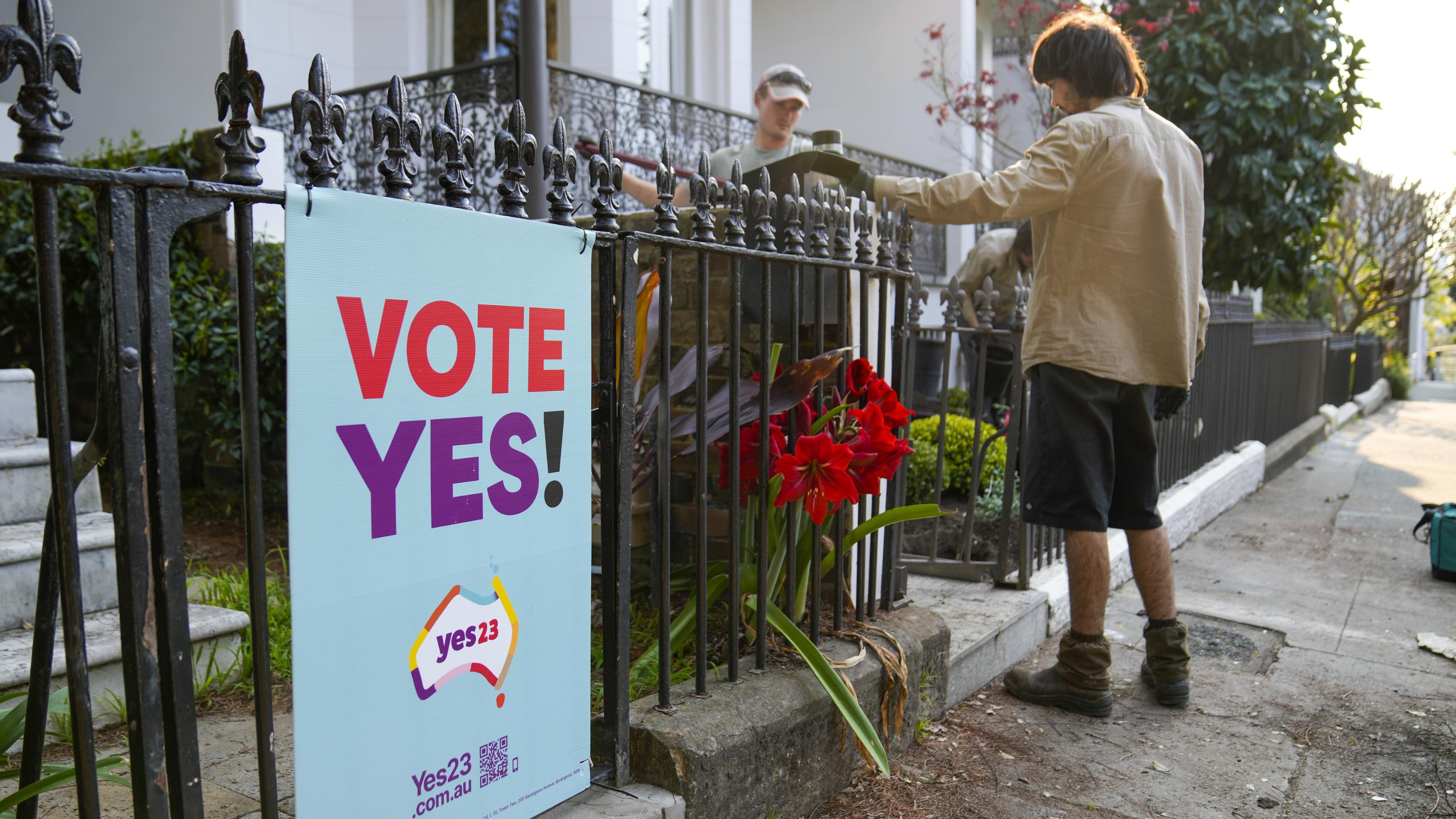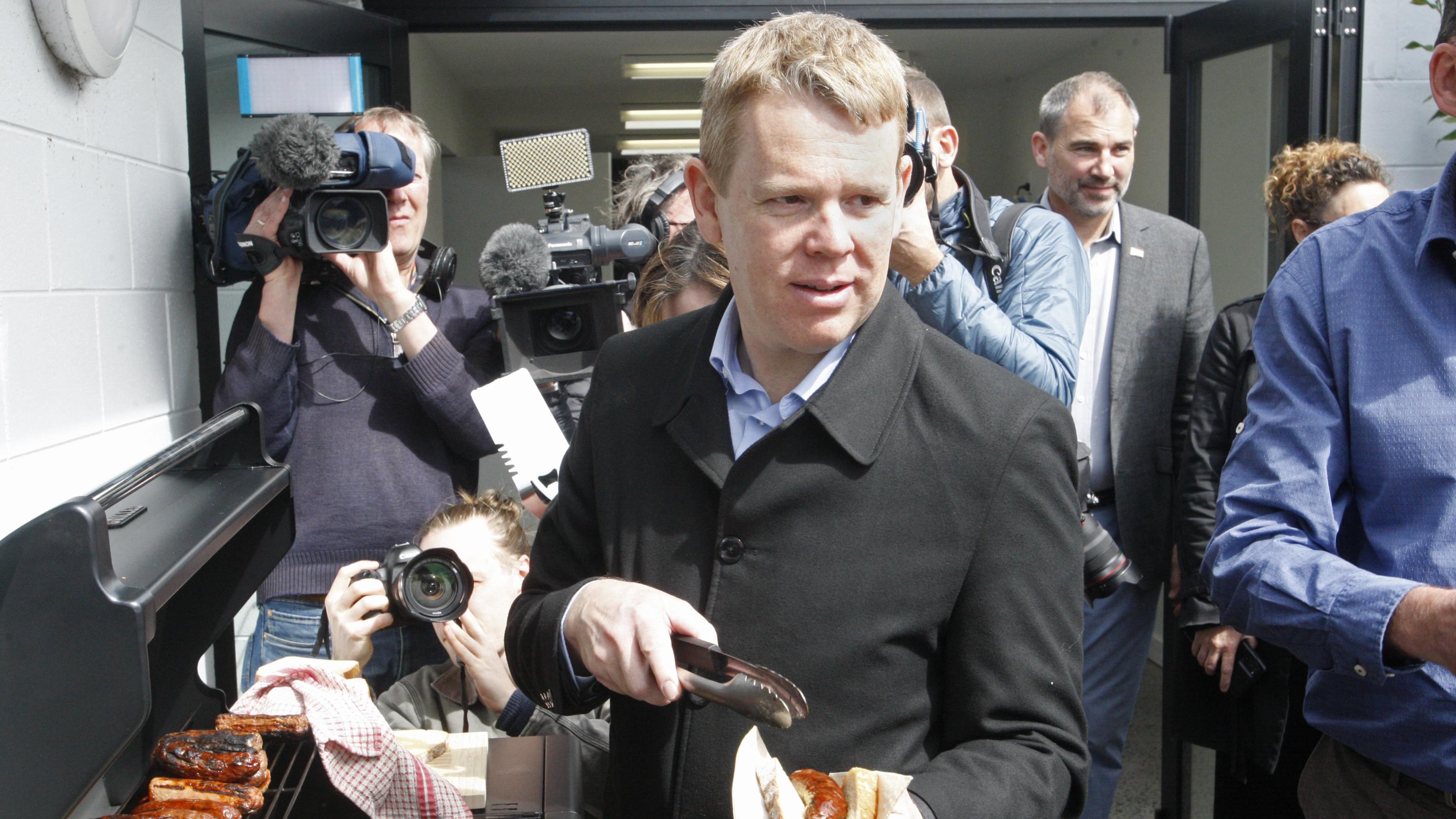 Landscapers work near a vote Yes poster for the Voice referendum in Sydney, Australia, Sept 11, 2023. (PHOTO / AP)
Landscapers work near a vote Yes poster for the Voice referendum in Sydney, Australia, Sept 11, 2023. (PHOTO / AP)
Indigenous Voice referendum and New Zealand general election both hang in balance
Two important votes will take place on Oct 14: A general election in New Zealand and a referendum in Australia on giving indigenous people a voice in the national parliament.
Opinion polls indicate New Zealand's ruling Labour Party will lose while Australian Prime Minister Anthony Albanese is expected to see a resounding No vote in the referendum.
The Aboriginal and Torres Strait Islander Voice has been one of Albanese's key election promises but the long-drawn-out campaign to secure a Yes vote has created deep divisions within Australia
The Aboriginal and Torres Strait Islander Voice has been one of Albanese's key election promises but the long-drawn-out campaign to secure a Yes vote has created deep divisions within Australia.
The Voice will advise the Australian Parliament and Government on matters that affect the lives of Aboriginal and Torres Strait Islander peoples including issues such as education, health, housing, justice, and other policies with a practical impact on First Nations people.
ALSO READ: The fragmented forces opposing Australia's Indigenous referendum
This would seem straightforward but since Australia came into being in 1901 there have been 44 referenda in Australia with just eight being successful.
Recent polls show support for the No vote at around 60 percent with Yes at 30-40 percent.
Prominent Nocampaigner and aboriginal Warren Mundine says many Australians are supporting the Voice because of misplaced guilt about indigenous history.
He recently told the National Press Club that the referendum would take away traditional rights and homogenize Aboriginal and Torres Strait Islander people.
He said the Voice proposal was based on anger and grievance and risked leaving indigenous people stuck in a self-perpetuating cycle of disadvantage.
ALSO READ: Aussie PM votes in struggling referendum on Indigenous rights
"The fact is that most Indigenous Australians are doing fine," he said. "They don't need a special Indigenous Voice. It is wrong to tell young people growing up in these families that they are disadvantaged because they are indigenous."
A No vote on Oct 14 will seriously impact Albanese's standing. As for the future of the Voice, Albanese has said on numerous occasions: "There is no plan B".
Across the Tasman Sea, the ruling Labour Party is expected to be thrown out in favor of a Conservative coalition.
Labour came to power in 2017 led by Jacinda Ardern, who was praised for handling crises such as the COVID pandemic and 2019's deadly mosque shooting in Christchurch.
 New Zealand's Prime Minister Chris Hipkins hands out sausages on Sept 25, 2023, at an event in New Plymouth to promote renewable energy. (PHOTO /AP)
New Zealand's Prime Minister Chris Hipkins hands out sausages on Sept 25, 2023, at an event in New Plymouth to promote renewable energy. (PHOTO /AP)
Ardern shocked supporters in January this year when she suddenly announced she was stepping down as prime minister and quitting politics. The ball was then thrown to Chris Hipkins to lead the party to the election but recent polls put Labour's popularity down at 26 percent.
Richard Shaw, a professor of politics at Massey University in New Zealand, told China Daily there were a couple of reasons why Labour has lost support.
"The first is that the government seems to have run out of steam, following five years' worth of crises," he said, adding that the government is "looking tired".
"In the last six months or so, there have also been a string of ministerial resignations, which have called the government's competence into question," Shaw said.
ALSO READ: NZ PM returns to campaign trail after recovering from COVID
"The main thing though, would be the cost-of-living crisis, which has really started to bite. Much of that is beyond the government's control, but it is taking responsibility for the crisis, nonetheless."
For many New Zealanders, there has been a growing sense that Labour has failed to deliver on several of its major promises
For many New Zealanders, there has been a growing sense that Labour has failed to deliver on several of its major promises.
"We have real issues with an unaffordable housing market, wealth and income inequality, and pretty lousy infrastructure," Shaw said.
Grant Duncan, a political scientist based in Auckland, New Zealand, told China Daily that Labour achieved a lot in getting New Zealand through the pandemic with very low mortality.
"They made some progress on child poverty and passed a Zero Carbon Act with assistance from the Greens.
ALSO READ: NZ farmers set for right-wing protest vote over green policies
"Labour's big mistake was to fail to acknowledge the pain that the COVID restrictions and vaccine mandates were causing. And it's perhaps moved a bit too fast on indigenous rights, without seeking support from a wider section of society."
The man many analysts say could swing the election either way on Oct 14 is Winston Peters and his New Zealand First party.
It was Peters who threw his support behind Ardern when she was elected and his backing could be crucial once more.
"It looks like Peters will hold the balance of power – again. But he may not be able to negotiate with Labour this time," Duncan said. "(The) National (party) and the ACT party don't really want to work with him, but they may have no other choice."
Recent polls have raised the possibility of a coalition government among Labour, New Zealand First, and the Greens, Duncan said.
READ MORE: NZ election campaign steps up with cost of living in focus
Shaw said a conservative win on Oct 14 will see several changes, especially on the economic front.
He said one of the first things that is likely to happen, given the National Party's position on the housing market, is that the price of housing and rental properties will increase.
"There will be tax cuts, which will disproportionately benefit middle to high-income earners, there will be yet another restructuring of an already overburdened public health system, and there will be a return to the days of stricter sanctions against beneficiaries. Standard conservative policy fare, in other words," he said.


